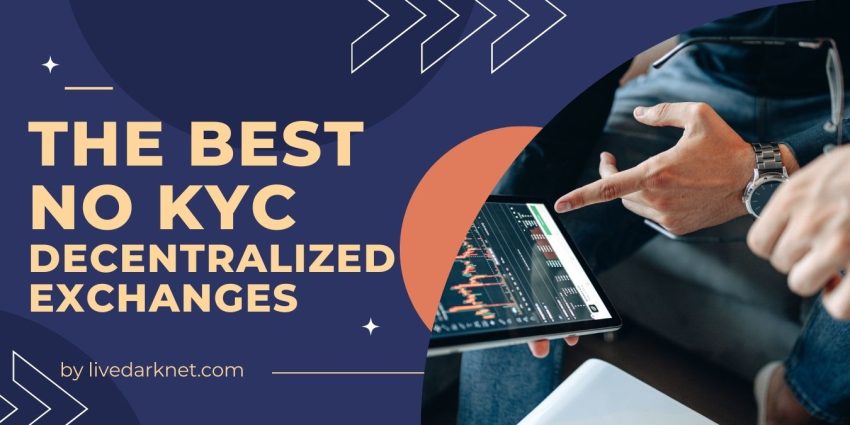The world of online transactions has exploded over the last decade. While this is beneficial for most parts of the world it’s also opened up opportunities for some shady transactions to take place. That’s where decentralised exchanges come in. These exchanges are designed to give a level of transparency to all who use them and “Know Your Customer” is a feature used by many DEX exchanges as an extra level of transparency. But is it necessary and are there DEX’s that don’t have KYC?
In this article, we’ll cover the top five decentralized exchanges that don’t need KYC. Let’s get started.
What is DEX?
Let’s first kick-off by discussing what a DEX is. DEX stands for decentralized exchange, which is a peer-to-peer marketplace where you can trade cryptocurrency with other people without having a middleman facilitate the transfer. If you take a look at exchanges like Binance and CoinBase, they all act as intermediaries overseeing your transactions and assets. With DEX you use smart contacts to directly trade with other users.
What is KYC?
People are often drawn to custodial exchanges because they offer a better sense of security. With a third party overseeing transactions, there’s less chance of something opening to your money right. Because DEX doesn’t have this, people often shy away from using them in the first place.
That’s why “Know Your Customer” was introduced. DEX started using KYC protocols to build trust among users. KYC requires users to sign up for DEX by providing their identity information to ensure transparency. This allowed users to see who they were dealing with, which allowed for more trust between users.
Why Dark Web Users Love No KYC Decentralized Exchanges
Firstly, privacy is the name of the game. Using KYC diminishes all OpSec so if you’re not sticking to it at all levels, you’re doing something wrong as a dark web user. So we’re looking at the top DEX for darknet users too.
Darknet users thrive on maintaining their anonymity, and DEX without KYC allows them to trade cryptocurrencies without divulging personal information. Unlike centralized exchanges that often require identity verification, DEX operates on a decentralized blockchain, where users have more control over their data.
Since DEX operates without a central authority, there’s no single point of control or potential data breach. This aligns with the ethos of the darknet, where users aim to minimize the risks associated with centralized platforms that could be susceptible to hacking or government intervention.
In essence, the use of DEX without KYC in the darknet is a calculated choice for those who prioritize privacy, avoid unwanted attention, and appreciate the decentralized nature of cryptocurrency transactions. It’s a dance in the shadows, where every move is carefully crafted to stay beneath the radar. So, let’s go into it now
Top 5 DEX that don’t need KYC
Unfortunately, not everyone wants their identity displayed for everyone to see. Some prefer to do transactions privately. So if you don’t want to use a custodial exchange and don’t want to use DEX with KYC, what do you do? Luckily, there are DEXs that don’t use the KYC protocol. Here are 5 of the top 5 DEX that don’t need KYC:
1. Changelly

Perfect for beginners, Changelly stands out as an excellent instant exchange platform where you can swap cryptocurrencies without the hassle of KYC verification. The process is super quick, easy, and secure, just follow three simple steps, and you’ll have your new crypto in your wallet in 30 minutes or less.
Changelly supports over 400 cryptocurrencies, letting you trade at fixed or floating rates and even purchase them using 90+ fiat currencies. With more than seven years in the market and millions of happy users, Changelly ensures a trustworthy experience.
Their mobile app is a game-changer, providing a speedy way to get crypto on the go, along with price alerts, the latest crypto news, and more. Plus, Changelly offers 24/7 live support via email and live chat to address any questions. Transactions are impressively fast, typically taking under 15 minutes, with a transparent 0.25% exchange fee and standard network fees.
| Pros | Cons |
|---|---|
| No hidden fees | No built-in wallet |
| Exchanges done in 3 simple steps | Transfers can be done with people who have KYC |
| Fixed and floating rates | |
2.Bitcoke

BitCoke is an exchange based in Hong Kong, which kicked off in 2019. Initially, they were all about derivatives, but now they’ve expanded to include spot trading and cloud mining options.
So what sets them apart? Well, they’ve got a speedy trading system, a lot of available funds (liquidity), and this unique feature called quanto swap. With quanto swap, you can use BTC, ETH, or USDT to trade and settle various contracts. It’s like this combo of different contracts, making BitCoke a standout choice for trading.
They’ve also got a handy chart for pro traders, plus another one similar to Tradingview. And there’s a Fund system that lets you manage your money across different accounts – you can transfer funds, set risk levels, tweak how much you’re borrowing, and even get alerts.
If you’re into swapping regular money for crypto, they’ve got a straightforward OTC-desk for handling big trades without any surprises. And the cool part? BitCoke isn’t limited to your computer; it works on your phone too. Everything syncs up seamlessly, making it super easy to keep tabs on all your trades.
| Pros | Cons |
|---|---|
| Some of the best trading fees in the industry | No live customer support |
| Easy to register | |
| Easy-to use interface | |
3. TradeOrge

Tradeogre is a crypto exchange launched in 2018, headquartered in California, US. While it might seem a bit mysterious at first, it has stood the test of time and offers solid trading features. The company has consistently gone above and beyond in delivering its services.
However, it might not be the best choice for beginners. It doesn’t support fiat money trading and you won’t find pairs with USD or EUR. Plus, it leans towards private cryptos, those lesser-known coins that need careful analysis of their performance and history.
That said, it does offer the most popular pairs in the market, like Bitcoin, Ethereum, Tether, and more. It’s often referred to as an old-school, centralised platform, unlike decentralised ones like Binance.
| Pros | Cons |
|---|---|
| Appealing trading fees | Limits perpetual trading |
| Nice range of coins | Has some relatively new exchanges |
| Low withdrawal fees | |
| Fast and easy sign-up |
4. ChangeNOW

ChangeNOW is an easy way to trade crypto, whether you’re just starting or you’re experienced. The cool thing is, you don’t need to go through any complicated ID stuff (KYC). Your interests are protected, and you can quickly swap different cryptocurrencies without a hassle.
No need for an account, just connect your hardware wallet, and you’re good to go. ChangeNOW works fast, and here’s the best part: it doesn’t keep your money, working directly with your wallets.
It’s also friends with other exchanges that skip the ID checks, and you can use debit cards to turn your regular money into crypto. They’ve got apps for your phone (iOS and Android), so you can trade on the fly.
No worries about how much you can take out, they have unlimited withdrawal limits for total freedom with your money. While they don’t have help around the clock, they promise to answer your questions by email within 24 hours. Transactions happen pretty quick, usually within 5 to 30 minutes. Just remember, fees can change but usually start at a reasonable 0.4%.
| Pros | Cons |
|---|---|
| Non-KYC | No crypto-to-fiat conversion |
| Great customer service | |
| User-friendly interface | |
| Unlimited withdrawing limits |
5. FixedFloat

Fixedfloat is an easy crypto exchange where you trade directly with others, and the best part is, you don’t need to do any complicated ID stuff (KYC). Your assets are safe because Fixedfloat doesn’t hold onto them. It’s super simple, just connect your wallet and start trading. They’re fast, with quick confirmations making transactions speedy.
For crypto newbies, Fixedfloat has clear info on each cryptocurrency, and you can bookmark your favorites for easy trading. They keep fees straightforward with a flat network fee for every transaction. You can choose between a floating or fixed rate, where the floating rate depends on your trade’s size, and fees change based on market limits.
Here’s the good stuff: unlimited withdrawals and 24/7 live chat support. Transactions usually take around 30 minutes. The pricing is clear, a 0.5% float rate for trading and a 1% network fee, making it simple and competitive for users.
| Pros | Cons |
|---|---|
| Fixed-rate exchange rates | No fiat currencies |
| Easy-to-use interface | Very few cryptocurrencies |
| Easy registration with no KYC | |
| Fast transaction speeds |
Frequently Asked Questions
DEXs make security a top priority using blockchain tech, smart contracts, and cool cryptographic tricks. Some even use decentralized governance models to make sure the platform stays trustworthy.
Yep, on many DEXs that skip the KYC stuff, you can cash out without dealing with identity verification. But keep an eye on withdrawal limits, they might have some rules.
While DEXs give you extra privacy, it’s good to know the risks. Things like fewer options if there’s a problem and not having all the security features you get on regular exchanges. Just got to be aware of the trade-offs.

